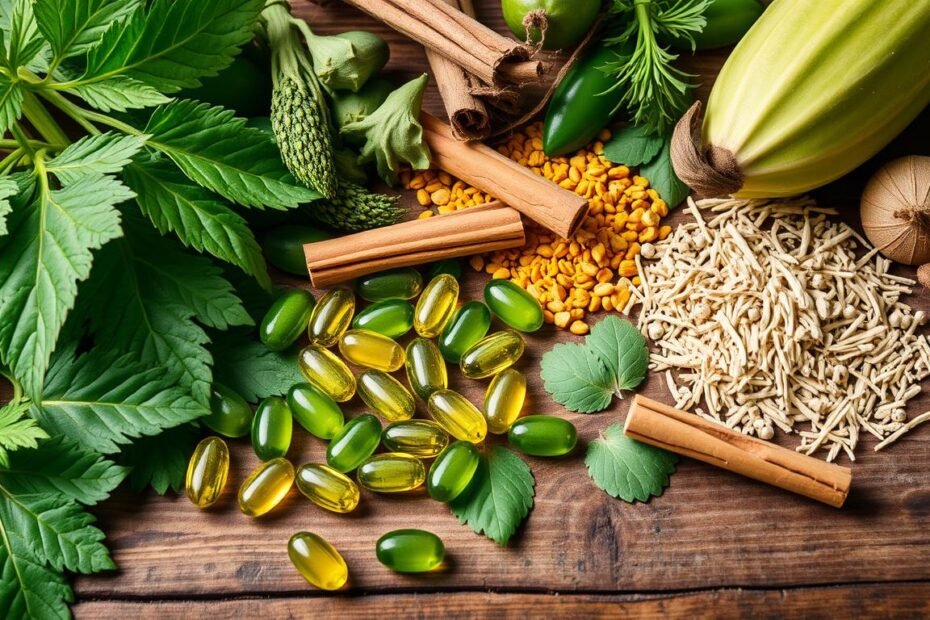Have you ever thought about nature’s role in managing type 2 diabetes? Exploring natural diabetes treatments has shown me the power of herbal remedies. They can work alongside traditional treatments. From old traditions to new studies, these plant-based options give hope for controlling blood sugar.
Type 2 diabetes now affects people of all ages, even kids1. With the cost of diabetes care expected to hit US$330 billion in the U.S. by 2020, many are looking at natural options2. The FDA says there are over 29,000 nutritional supplements out there, and Americans spend more than US$12 billion on them each year2.
In my search for the best herbal remedies for type 2 diabetes, I found many natural choices. Cinnamon and bitter melon could help lower blood sugar levels1. But it’s important to remember, these remedies should be used with traditional treatments. Always talk to a healthcare professional before trying them.
Key Takeaways
- Herbal remedies can complement conventional diabetes treatments
- Cinnamon and bitter melon show potential in managing blood sugar levels
- Natural treatments should not replace prescribed medications
- Consult healthcare professionals before using herbal supplements
- Type 2 diabetes affects people of all ages, including children
- The financial burden of diabetes is expected to increase significantly
Understanding Type 2 Diabetes and Herbal Remedies
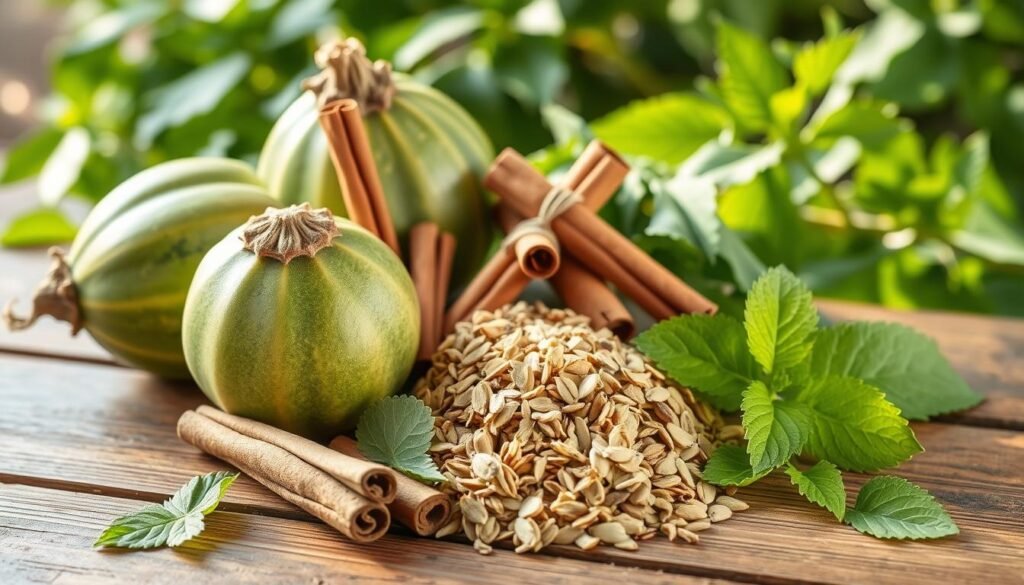
Type 2 diabetes is a complex metabolic disorder that affects millions worldwide. Many people are now exploring diabetes alternative medicine to help manage their condition.
What is Type 2 Diabetes?
Type 2 diabetes happens when the body doesn’t use insulin well or doesn’t make enough of it. This leads to high blood sugar levels. If not treated, it can cause serious health problems.
The number of people with type 2 diabetes is rising. Experts predict it will keep going up by 20303.
The Role of Herbal Remedies in Diabetes Management
Herbs and plants are becoming more popular for managing diabetes. Some can lower blood sugar, make insulin work better, or fight off harmful free radicals. For instance, broccoli, cinnamon, and fenugreek seeds might help reduce inflammation and improve insulin use4.
Some herbs could be useful for diabetes care. American ginseng might help lower sugar levels, but we need more studies4. Blueberries are full of anthocyanins and could help control blood sugar and prevent liver fat buildup3.
Importance of Consulting Healthcare Professionals
Even though herbal remedies can be helpful, it’s important to talk to doctors before starting them. The FDA doesn’t control herbs and supplements, so their quality can vary a lot. A study found some herbal products had dangerous substances like lead and arsenic, and some didn’t even list all their ingredients4.
I suggest a balanced approach. Using both traditional treatments and herbal remedies, with a doctor’s advice, can be the best way to manage type 2 diabetes.
Aloe Vera: A Promising Natural Diabetes Treatment
Aloe vera is known for its healing powers and could be a natural way to treat diabetes. It has over 200 active substances, like vitamins and minerals, making it rich in nutrients5.
Studies show aloe vera could help control blood sugar levels. A review found it can lower fasting blood sugar by 46.6 mg/dL and A1C levels by 1.05%5. Another study showed it can reduce A1C by 0.4% and fasting glucose by 30 mg/dl for those with prediabetes or early type 2 diabetes5.
A small study with type 2 diabetes patients showed good results. Those who took 200 mg of aloe vera gel powder daily for three months saw their fasting blood glucose drop by 15.4%. They also had 10.1% less total cholesterol and 14.6% less LDL cholesterol5. This suggests aloe vera could be helpful in controlling blood sugar.
“Aloe vera shows potential in managing diabetes, but more research is needed to establish its long-term safety and efficacy.”
Even though aloe vera looks promising, we need to be careful. The National Center for Complementary and Integrative Health says it can lower blood sugar too much, causing hypoglycemia6. Always talk to a healthcare provider before using aloe vera for diabetes.
| Aloe Vera Form | Potential Benefits | Precautions |
|---|---|---|
| Gel powder | Lowered fasting blood glucose and cholesterol | May interact with diabetes medications |
| Juice | May help reduce body fat and weight | Can cause diarrhea and abdominal discomfort |
| Latex | Not recommended for diabetes management | Can cause kidney damage and act as a laxative |
More research is needed to figure out the best way to use aloe vera for diabetes. Scientists are still discussing if it’s a good strategy for managing diabetes6. Always work with your healthcare team to safely and effectively use any herbal supplements for blood sugar control56.
Cinnamon: Spice Up Your Diabetes Management
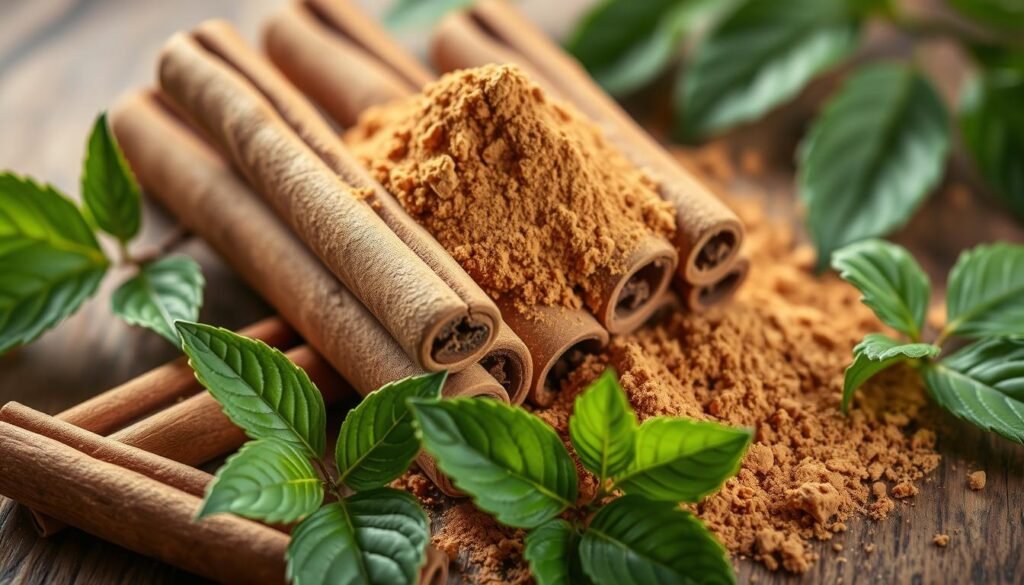
Cinnamon is now seen as a top herbal remedy for type 2 diabetes. This spice could help control blood sugar levels, making it a favorite among those fighting diabetes.
How Cinnamon Affects Blood Sugar Levels
Studies show cinnamon might help lower blood sugar and make insulin work better in type 2 diabetes. A 2019 review found cinnamon can cut down blood sugar and insulin resistance more than a placebo7. Another study said cinnamon could reduce hemoglobin A1c by 0.27% to 0.83% in type 2 diabetes patients7.
Recommended Dosage and Forms of Cinnamon
Most studies looked at 1 to 6 grams of cinnamon a day7. I suggest starting with a small amount and increase it with a doctor’s advice. You can add cinnamon to your meals by:
- Sprinkling it on oatmeal or yogurt
- Adding it to smoothies or tea
- Using it in baking recipes
Ceylon cinnamon has more antioxidants than Cassia cinnamon, which might be better for you but costs more7.
Potential Side Effects and Precautions
Cinnamon supplements are usually safe for short periods and small amounts, but high doses or long use might cause stomach problems or allergic reactions8. People with liver issues should be careful with cinnamon8.
“Diabetes management involves a multi-faceted approach that includes healthy eating, regular exercise, blood sugar monitoring, and sometimes, diabetes medications or insulin therapy.”
Always talk to a healthcare professional before adding cinnamon or other herbal remedies to your diabetes care plan. While cinnamon looks promising, we need more studies to know how it affects insulin in diabetes8.
| Cinnamon Type | Antioxidant Content | Coumarin Content | Cost |
|---|---|---|---|
| Ceylon Cinnamon | Higher | Lower | More expensive |
| Cassia Cinnamon | Lower | Higher | Less expensive |
Adding cinnamon to your diet and working with your doctor could improve your diabetes care. But, always focus on a balanced plan that includes good food, exercise, and any medicines your doctor prescribes.
Bitter Melon: The Diabetes-Fighting Fruit
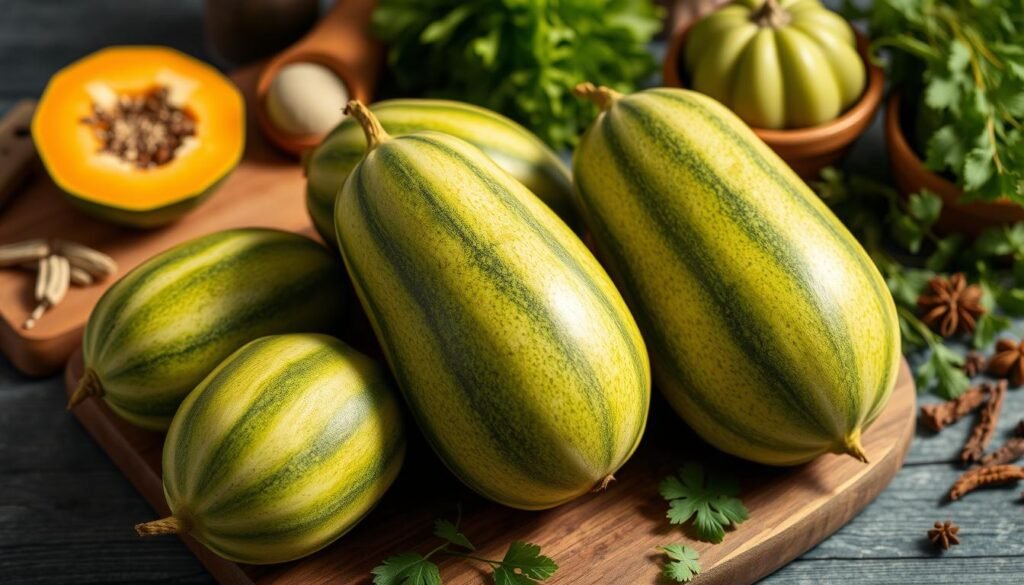
I’ve found a natural way to help manage diabetes that’s getting a lot of attention: bitter melon. This fruit, known as Momordica charantia, grows in many places like South America, Asia, Africa, and the Caribbean9.
Researchers are looking at bitter melon because it might help lower blood sugar. It works like insulin, helping glucose get into cells for energy10. It’s full of vitamins A and C, and iron, which are good for you10.
A study showed good results after four weeks. People taking 2,000 mg of bitter melon every day had lower blood sugar levels9. But, not all studies agree. A 2007 study in the Journal of Clinical Epidemiology didn’t find it helped type 2 diabetes9.
If you’re thinking about using bitter melon for diabetes, know the risks. You could have stomach problems, it might affect your meds, and it could harm your liver10. Always talk to a doctor before trying it.
Bitter melon could be a good option for diabetes, but we need more studies. The British Journal of Nutrition says we need better studies to see if it really helps with diabetes9. As we look into natural ways to fight diabetes, bitter melon is something we should keep an eye on.
Best Herbal Remedies for Type 2 Diabetes
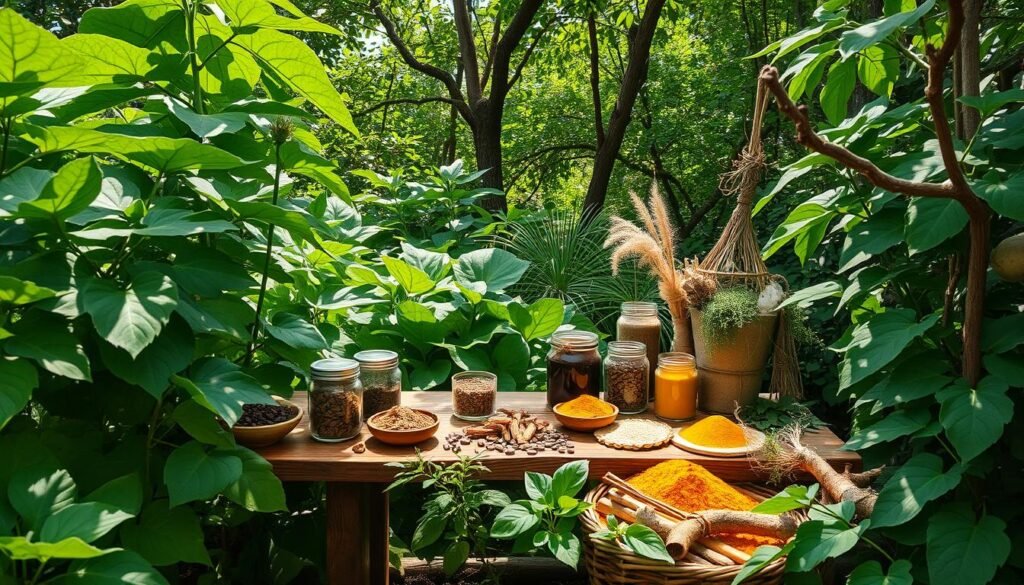
Herbal remedies have been around for thousands of years to help with health issues, including diabetes. Today, about 25% of prescription medicines come from plants, showing how important plants are in healthcare11. I looked into some top herbal remedies for type 2 diabetes and supplements for blood sugar control. Let’s see what they can do.
Fenugreek: Seeds of Blood Sugar Control
Fenugreek seeds are a top choice for diabetes. A study over three years showed that taking powdered fenugreek seed helped prevent type 2 diabetes in some people12. It might help control blood sugar in type 2 diabetics, but we need more studies to be sure13.
Gymnema Sylvestre: The “Sugar Destroyer”
Gymnema sylvestre, called the “sugar destroyer,” could be a big help in managing diabetes. A 2019 review said it could lower blood sugar and boost antioxidants12. In traditional Ayurvedic medicine, it’s known for lowering blood sugar and might even help fix islet cells in animals13.
Ginger: A Spicy Solution for Insulin Resistance
Ginger is more than just a flavor booster – it might fight diabetes. A 2017 study found that ginger could lower blood sugar and HbA1c levels12. This root could be a natural way to make insulin work better.
| Herb | Potential Benefits | Study Findings |
|---|---|---|
| Fenugreek | Blood sugar control | Reduced risk of type 2 diabetes in prediabetics |
| Gymnema Sylvestre | Glucose reduction, antioxidant boost | Lowered blood glucose, increased antioxidants |
| Ginger | Insulin sensitivity improvement | Reduced fasting blood glucose and HbA1c levels |
These herbal remedies look promising, but they’re not a substitute for your doctor’s advice. Always check with your doctor before adding herbal supplements to your diabetes care plan13. Using natural remedies and traditional treatments together could help manage type 2 diabetes better.
Chromium and Magnesium: Mineral Supplements for Diabetes
Chromium and magnesium are minerals that might help control blood sugar levels. But, we need to be careful with these supplements for diabetes.
Chromium helps with glucose metabolism by making insulin work better. Some studies show that chromium supplements could help manage diabetes, especially in people who lack chromium14. But, the American Diabetes Association (ADA) says not to take supplements unless you really need them15.
Magnesium also helps control blood sugar. If you don’t have enough magnesium, insulin production can be off and insulin resistance can increase. Eating foods high in magnesium like whole grains, nuts, and leafy greens might help prevent type 2 diabetes.
“Eating whole foods is the best way to absorb and utilize vitamins and minerals effectively.”
Remember, supplements aren’t checked by the FDA, and their effects can differ15. Always talk to a healthcare provider before starting any supplements, as they can affect diabetes medicines and cause problems15.
| Mineral | Potential Benefits | Food Sources |
|---|---|---|
| Chromium | May improve insulin effectiveness | Broccoli, grape juice, whole grains |
| Magnesium | Supports insulin secretion and sensitivity | Spinach, almonds, black beans |
These minerals look promising, but we need more research to know safe amounts and long-term effects. I suggest eating a balanced diet full of whole foods as the main way to manage blood sugar.
Green Tea and Resveratrol: Antioxidants for Diabetes Management
Natural diabetes treatments are becoming more popular. Antioxidants in green tea and resveratrol are being studied for their benefits. They help manage blood sugar and reduce oxidative stress, which are important for diabetes care.
Green Tea’s EGCG: A Powerful Antioxidant
Green tea has a strong antioxidant called epigallocatechin gallate (EGCG). This antioxidant can improve how the body handles glucose and make insulin work better. It’s a great tool for managing diabetes. Studies show that green tea’s compounds can lower inflammation and protect the brain1617.
Resveratrol: The Red Wine Compound
Resveratrol is a polyphenol found in grape skin, peanuts, and berries. It might help prevent high blood sugar. Wine is a good source, but drinking it in moderation is key16. Research points to its protective effects on diabetes and blood vessels17.
Combining Antioxidants with Conventional Treatments
These antioxidants are promising, but they shouldn’t replace standard diabetes treatments. They can be added to your routine with a doctor’s guidance. Remember, about 1 in 8 Americans has diabetes, and another 4 out of 10 are at risk16.
| Antioxidant | Source | Potential Benefits |
|---|---|---|
| EGCG | Green Tea | Improved glucose tolerance, enhanced insulin function |
| Resveratrol | Red Wine, Grapes | Prevention of high blood sugar, reduced oxidative stress |
| Catechins | Green Tea | Reduced inflammation, brain health protection |
Adding these antioxidants to your diet can be easy with smoothies. Just remember to include protein and fat to avoid blood sugar spikes16. Always talk to your doctor before changing your diabetes care plan.
Lifestyle Changes to Complement Herbal Remedies
I believe in a holistic approach to diabetes management. Combining lifestyle changes with complementary therapies can greatly improve outcomes. Eating a diet full of fiber and plant-based foods like broccoli and leafy greens helps fight inflammation and boost insulin sensitivity.
Regular exercise is key. Try to get at least 150 minutes of moderate exercise each week. This can be brisk walking, swimming, or cycling. Keeping a healthy weight is also crucial for managing diabetes well.
Stress reduction is important for diabetes management. Techniques like guided imagery and biofeedback can help. These methods lower cortisol levels, which affects blood sugar control.
| Lifestyle Change | Potential Benefits |
|---|---|
| Balanced Diet | Improved insulin sensitivity, reduced inflammation |
| Regular Exercise | Better glucose uptake, weight management |
| Stress Reduction | Lower cortisol levels, improved blood sugar control |
Adding herbal remedies can boost these lifestyle changes. Aloe vera, psyllium fiber, and fenugreek seeds have shown promise in lowering HbA1c levels18. It’s key to note that herbal medicines are popular, with use ranging from 17% in the UK to 72% in the USA. However, their effectiveness can differ18.
A good diabetes management plan should mix lifestyle changes, medical treatments, and herbal remedies with professional advice. This approach gives the best chance for controlling blood sugar and improving health.
Conclusion
I’ve looked into the best herbal remedies for type 2 diabetes. These natural treatments can help manage the disease. Over 150 million people worldwide have diabetes, and this number could hit 300 million by 202519. This shows we need effective ways to manage it, like using herbs.
Studies have found over 40 plants that can help with diabetes, like Gymnema sylvestre and Aloe vera19. These plants offer hope for a natural way to fight diabetes. In places like Saudi Arabia and Kuwait, 30% of diabetes patients use herbs in their treatment20.
Even though herbal remedies look promising, we must be careful. In Kuwait, 71% of those using herbs didn’t control their blood sugar well, unlike 40% who didn’t use them20. This shows we should always get medical advice before trying natural treatments. Mixing traditional medicine with the right herbal remedies might be the best way to manage type 2 diabetes.
FAQ
What is the role of herbal remedies in managing type 2 diabetes?
Herbal remedies can help manage type 2 diabetes by lowering blood sugar, making insulin work better, or fighting free radicals. But they should not replace your doctor’s advice or insulin. Always talk to a healthcare professional before using them.
How can aloe vera help in diabetes management?
Aloe vera might protect and fix insulin-producing cells in the pancreas, thanks to its antioxidants. It could also lower blood sugar, improve blood fats, and make insulin work better. But we need more studies to be sure it’s safe and works well.
What are the potential benefits of cinnamon for type 2 diabetes?
Cinnamon might help lower blood sugar and improve insulin use in people with type 2 diabetes. It can also make food taste sweet, which might mean eating less sugar. But we need more research to know how much cinnamon is best and its real effects.
How can bitter melon help manage diabetes?
Bitter melon is a fruit used in traditional medicine. Studies suggest it can lower blood sugar levels. It comes in different forms like seeds, pulp, juice, and supplements, all of which might help control blood sugar.
What are some other herbal remedies that may help with type 2 diabetes?
Fenugreek seeds, gymnema sylvestre, and ginger might help lower blood sugar and improve insulin use. But we need more studies to understand their effects and how much to take for diabetes.
How can chromium and magnesium supplements help in diabetes management?
Chromium helps insulin work better. Magnesium is important for blood sugar control in type 2 diabetes. But we don’t fully understand their effects yet. More research is needed to know safe amounts and possible side effects.
Can antioxidants like green tea and resveratrol benefit people with type 2 diabetes?
Green tea has antioxidants that might lower heart disease risk, improve blood sugar, and help insulin work better. Resveratrol, found in wine and grapes, could prevent high blood sugar and reduce oxidative stress in animals. But human studies are limited, and these supplements should not replace your diabetes treatment.
What lifestyle changes can complement the use of herbal remedies for type 2 diabetes?
Eating well, staying active, keeping a healthy weight, and managing stress can help with herbal remedies and regular treatments. A diet full of fiber, vitamins, and minerals from plants can also fight inflammation and improve insulin sensitivity.
